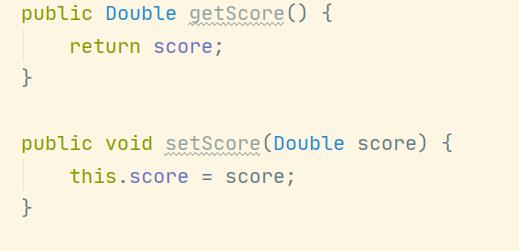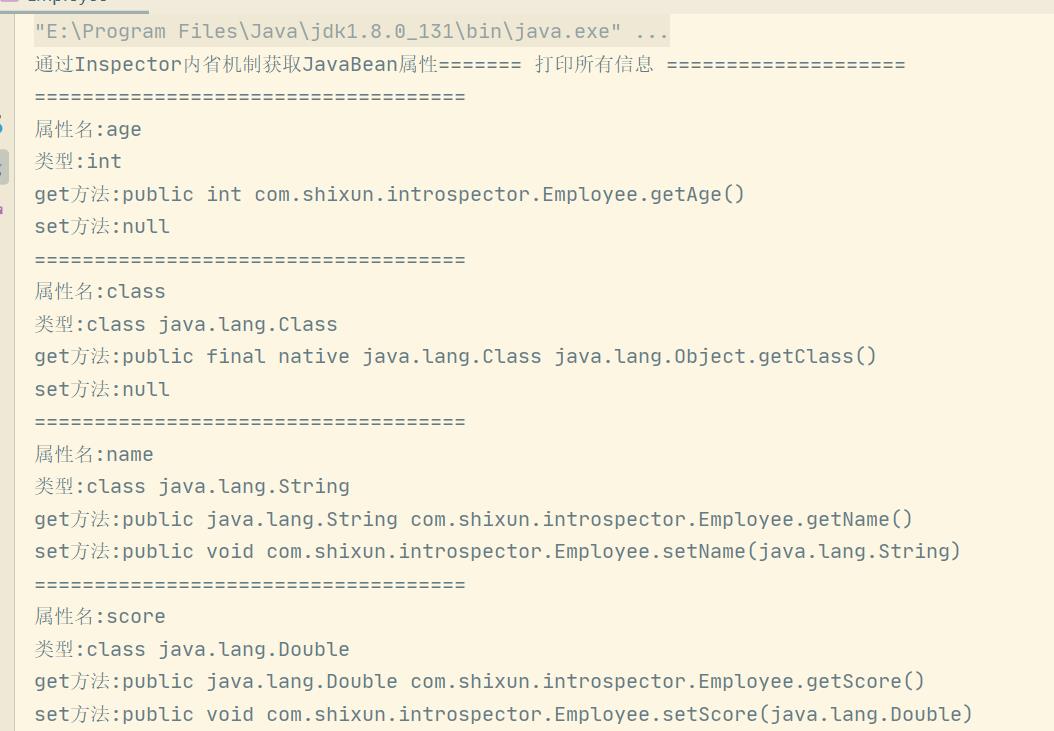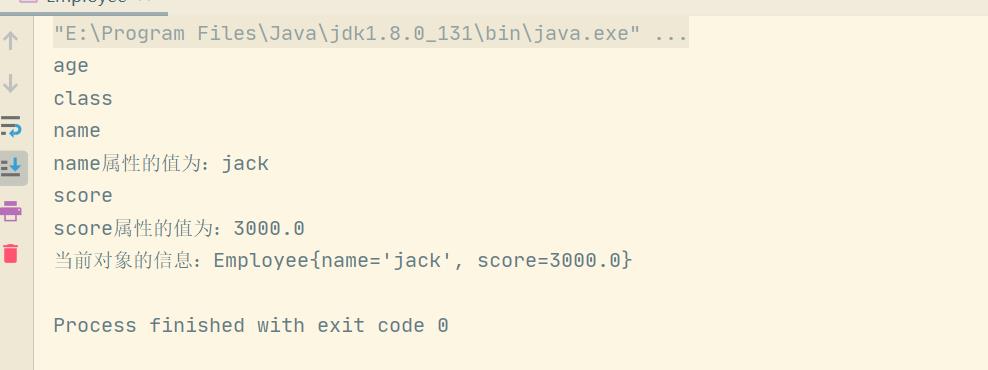Java 内省机制
Posted 流楚丶格念
tags:
篇首语:本文由小常识网(cha138.com)小编为大家整理,主要介绍了Java 内省机制相关的知识,希望对你有一定的参考价值。
概念
JavaBean
在实际编程中,我们常常需要一些用来包装值对象的类,例如Student、 Employee、Order,这些 类中往往没有业务方法,只是为了把需要处理的实体对象进行封装,有这样的特征:
-
属性都是私有的;
-
有无参的public构造方法;
-
对私有属性根据需要提供公有的getXxx方法以及setXxx方法;
比如:属性名称为name,则有getName方法返回属性name值, setName方法设置name值;注意方法的名称通常是get或 set加上属性名称,并把属性名称的首字母大写;这些方法称为getters/setters;getters必须有返回值没有方法参数; setter值没有返回值,有方法参数;
例如下面的例子:

符合这些特征的类,被称为JavaBean;
内省
内省(Inspector)机制就是基于反射的基础, Java语言对Bean类属性、事件的一种缺省处理方法。
只要类中有getXXX方法,或者setXXX方法,或者同时有getXXX及setXXX方法,其中getXXX方 法没有方法参数,有返回值; setXXX方法没有返回值,有一个方法参数;那么内省机制就认为 XXX为一个属性;
例如下面代码
Employee类中根本没有声明age属性,仅仅是声明了这样的getter和setter.内省机制就认为age是属性
package com.shixun.introspector;
public class Employee
private String name;
private Double score;
// age将被内省认为是属性
public int getAge()
return 30;
// name将被内省认为是属性
public String getName()
return name;
public void setName(String name)
this.name = name;
// score将被内省认为是属性
public Double getScore()
return score;
public void setScore(Double score)
this.score = score;
public static void main(String[] args)
相关API
与Java内省有关的主要类及接口有:
-
java.beans.Introspector类: 为获得JavaBean属性、事件、方法提供了标准方法;通常使用其中的getBeanInfo方法返回BeanInfo对象; -
Java.beans.BeanInfo接口:不能直接实例化,通常通过Introspector类返回该类型对象,提供了返回属性描述符对象(PropertyDescriptor)、方法描述符对象(MethodDescriptor) 、 bean描述符(BeanDescriptor)对象的方法; -
Java.beans.PropertyDescriptor类:用来描述一个属性,该属性有getter及setter方法;
可以使用PropertyDescriptor类的方法获取属性相关的信息,例如getName方法返回属性的名字:PropertyDescriptor类中定义了方法可以获取该属性的getter和setter方法
方法 方法描述 Method getReadMethod() 回属性对应的getter方法对象; Method getWriteMethod() 回属性对应的setter方法对象;
下面我们来用代码深入探究一下:
代码案例:获取属性相关信息
Employee如上面代码所示,继续编写主函数进行测试
首先用BeanInfo接口获取BeanInfo的对象,再通过BeanInfo对象获取PropertyDescriptor属性描述
//获取BeanInfo的对象
BeanInfo employeeBeanInfo = Introspector.getBeanInfo(Employee.class);
//通过BeanInfo对象获取PropertyDescriptor属性描述
PropertyDescriptor[] propertyDescriptors = employeeBeanInfo.getPropertyDescriptors();
System.out.println("通过Inspector内省机制获取JavaBean属性======= 打印所有信息 ====================");
Arrays.stream(propertyDescriptors).forEach(f->
System.out.println("====================================");
System.out.println("属性名:"+f.getName());
System.out.println("类型:"+f.getPropertyType());
System.out.println("get方法:"+f.getReadMethod());
System.out.println("set方法:"+f.getWriteMethod());
);
// 或者用增强for
System.out.println("通过Inspector内省机制获取JavaBean属性======= 打印所有信息 ====================");
for (PropertyDescriptor propertyDescriptor : propertyDescriptors)
System.out.println("====================================");
System.out.println("名字:" + propertyDescriptor.getName());
System.out.println("类型:" + propertyDescriptor.getPropertyType());
System.out.println("get方法:" + propertyDescriptor.getReadMethod());
System.out.println("set方法:" + propertyDescriptor.getWriteMethod());
运行结果如下:

我们也可以通过反射调用这里获取的get或set方法
//创建Employee的对象
Class<?> clazz = Class.forName("com.shixun.introspector.Employee");
Object employee = clazz.newInstance();
//遍历属性描述对象
for (PropertyDescriptor propertyDescriptor : propertyDescriptors)
//打印属性名称
System.out.println(propertyDescriptor.getName());
//判断属性名称是不是name
if (propertyDescriptor.getName().equals("name"))
//setter方法
Method writeMethod = propertyDescriptor.getWriteMethod();
//调用setName方法
writeMethod.invoke(employee, "jack");
//getter方法
Method readMethod = propertyDescriptor.getReadMethod();
//调用getName方法
Object nameValue = readMethod.invoke(employee);
System.out.println("name属性的值为:" + nameValue);
//判断属性名称是否为score
if (propertyDescriptor.getName().equals("score"))
//setter方法
Method scoreWriteMethod = propertyDescriptor.getWriteMethod();
//调用setScore方法
scoreWriteMethod.invoke(employee, new Double(3000));
//getter方法
Method scoreReadMethod = propertyDescriptor.getReadMethod();
Object scoreValue = scoreReadMethod.invoke(employee);
System.out.println("score属性的值为:" + scoreValue);
System.out.println("当前对象的信息:"+employee.toString());
运行结果如下所示:

全部代码附在最下方!!!!!!
内省属性的注意事项
-
很多框架都使用了内省机制检索对象的属性,定义属性名字时,名字最好起码以两个小写字母开
头,例如stuName,而不要使用sName,某些情况下,可能会导致检索属性失败; -
内省机制检索属性时,是根据getter和setter方法确认属性名字,而不是根据类里声明
的成员变量名称决定;
完整代码
package com.shixun.introspector;
import java.beans.BeanInfo;
import java.beans.IntrospectionException;
import java.beans.Introspector;
import java.beans.PropertyDescriptor;
import java.lang.reflect.InvocationTargetException;
import java.lang.reflect.Method;
import java.util.Arrays;
public class Employee
private String name;
private Double score;
// age将被内省认为是属性
public int getAge()
return 30;
// name将被内省认为是属性
public String getName()
return name;
public void setName(String name)
this.name = name;
// score将被内省认为是属性
public Double getScore()
return score;
public void setScore(Double score)
this.score = score;
@Override
public String toString()
return "Employee" +
"name='" + name + '\\'' +
", score=" + score +
'';
public static void main(String[] args) throws ClassNotFoundException, IntrospectionException, IllegalAccessException, InstantiationException, InvocationTargetException
//获取BeanInfo的对象
BeanInfo employeeBeanInfo = Introspector.getBeanInfo(Employee.class);
//通过BeanInfo对象获取PropertyDescriptor属性描述
PropertyDescriptor[] propertyDescriptors = employeeBeanInfo.getPropertyDescriptors();
// System.out.println("通过Inspector内省机制获取JavaBean属性======= 打印所有信息 ====================");
// Arrays.stream(propertyDescriptors).forEach(f->
// System.out.println("====================================");
// System.out.println("属性名:"+f.getName());
// System.out.println("类型:"+f.getPropertyType());
// System.out.println("get方法:"+f.getReadMethod());
// System.out.println("set方法:"+f.getWriteMethod());
// );
//
//
//
// System.out.println("通过Inspector内省机制获取JavaBean属性======= 打印所有信息 ====================");
//
// for (PropertyDescriptor propertyDescriptor : propertyDescriptors)
// System.out.println("名字:" + propertyDescriptor.getName());
// System.out.println("类型:" + propertyDescriptor.getPropertyType());
// System.out.println("get方法:" + propertyDescriptor.getReadMethod());
// System.out.println("set方法:" + propertyDescriptor.getWriteMethod());
//
//创建Employee的对象
Class<?> clazz = Class.forName("com.shixun.introspector.Employee");
Object employee = clazz.newInstance();
//遍历属性描述对象
for (PropertyDescriptor propertyDescriptor : propertyDescriptors)
//打印属性名称
System.out.println(propertyDescriptor.getName());
//判断属性名称是不是name
if (propertyDescriptor.getName().equals("name"))
//setter方法
Method writeMethod = propertyDescriptor.getWriteMethod();
//调用setName方法
writeMethod.invoke(employee, "jack");
//getter方法
Method readMethod = propertyDescriptor.getReadMethod();
//调用getName方法
Object nameValue = readMethod.invoke(employee);
System.out.println("name属性的值为:" + nameValue);
//判断属性名称是否为score
if (propertyDescriptor.getName().equals("score"))
//setter方法
Method scoreWriteMethod = propertyDescriptor.getWriteMethod();
//调用setScore方法
scoreWriteMethod.invoke(employee, new Double(3000));
//getter方法
Method scoreReadMethod = propertyDescriptor.getReadMethod();
Object scoreValue = scoreReadMethod.invoke(employee);
System.out.println("score属性的值为:" + scoreValue);
System.out.println("当前对象的信息:"+employee.toString());
以上是关于Java 内省机制的主要内容,如果未能解决你的问题,请参考以下文章